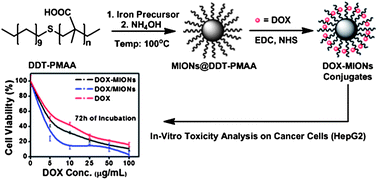Highly water-soluble magnetic iron oxide (Fe3O4) nanoparticles for drug delivery: enhanced in vitro therapeutic efficacy of doxorubicin and MION conjugates†
Abstract
We report a simple one step protocol for the preparation of fairly monodisperse and highly water-soluble magnetic iron oxide nanoparticles (MIONs) through a co-precipitation method using a novel multifunctional, biocompatible and water-soluble polymer ligand dodecanethiol–polymethacrylic acid (DDT–PMAA). DDT–PMAA owing to its several intrinsic properties, not only efficiently controls the size of the MIONs but also gives them excellent water solubility, long time stability against aggregation and oxidation, biocompatibility and multifunctional surface rich in thioether and carboxylic acid groups. The molecular weight and concentration of the polymer ligand were optimized to produce ultrasmall (4.6 ± 0.7 nm) MIONs with high magnetization (50 emu g−1). The MIONs obtained with 1.5 mM DDT–PMAA (5330 g mol−1) are highly stable in solution as well as in dry powder form for an extended period of time. These MIONs show a high degree of monodispersity and are superparamagnetic at room temperature. The polymer ligand and MIONs@Polymer were characterized by GPC, 1H NMR, DLS, TEM, FTIR-Raman, XRD, TGA and VSM. In order to demonstrate the bio-applications of these magnetic nanoparticles (NPs), their toxicity was determined by MTT assay and they were found to be non-toxic and biocompatible. Finally, MIONs were conjugated with the anti-cancer drug doxorubicin (DOX) and its efficacy, as a model drug delivery system, was determined using HepG2 cells. The efficiency of the drug–NP conjugates i.e., covalently bound DOX–MIONs and electrostatically loaded DOX/MIONs, was found to be significantly higher than that of the free drug (DOX).


 Please wait while we load your content...
Please wait while we load your content...